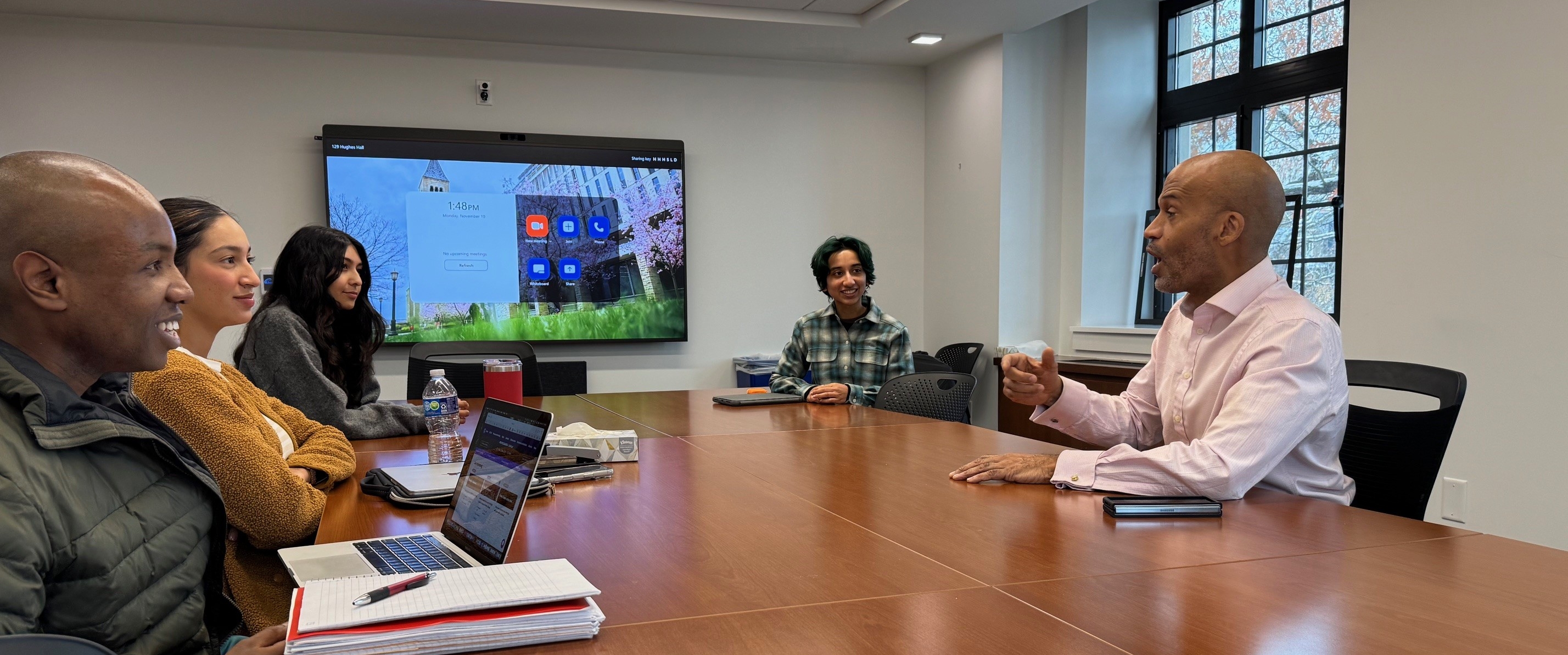This website uses cookies
We use cookies to ensure that we give you the best experience on our website. If you continue to use this site we will assume that you are happy with it.

Court systems don’t run on the academic calendar. Which is how three students in Cornell Law Schools’ Movement Lawyering Clinic started the fall 2025 semester by authoring a motion to dismiss charges against Ashley Spring in a case that has garnered national attention and underlined the Trump era’s ongoing drama of immigration crackdowns and grassroots resistance.
“I was like, ‘You have 12 days. You want to do this?’” recalled Carlton E. Williams, associate clinical professor of law, who runs the clinic and is representing Spring, a former school committee candidate and school nurse who was charged after intervening in a controversial and chaotic detention operation targeting local immigrants in Worcester, Massachusetts. “And they go, ‘Yes.’ ‘Are you scared?’ They go, ‘Very.’”
But Shireen Afzal ’26, Jake Brandvold ’26, and Ria Panchal ’27 got to work, armed with references to follow on and the inspiration from Williams that their motion could serve as a model for others in the future, and they delivered.
Spring was arrested in May 2025 during what Williams has dubbed the Eureka Street Incident. According to media accounts, Immigration and Customs Enforcement agents stopped three young members of a Brazilian immigrant family—twenty-one-year-old Augusta Clara Moura, her three-month-old daughter, and her seventeen-year-old sister—and then used them to lure Clara Moura’s mother, forty-year-old Rosane Ferreira-De Oliveira, out of the house. The federal agents then took Ferreira-De Oliveira into custody. (She was eventually granted asylum and was released from custody on October 2.)
Word went out through community organizations as the confrontation unfolded, and several dozen locals, including Spring, gathered at the scene. In turn, the Worcester Police Department was called to the scene to prevent the growing crowd from interfering with ICE and other federal agents.
After police officers tackled Ferreira-De Oliveira’ teenaged daughter, Spring felt compelled to come to her aid. They ran forward, picked up a bottle dropped by the three-month-old, and, according to the WPD, dumped its contents on an officer.
Spring was arrested and charged with felony assault and battery with a dangerous weapon—the “unknown liquid” in the bottle—in addition to misdemeanor charges of assault and battery, disorderly conduct and interfering with police.
However, Williams argued that multiple officers at the scene clearly acknowledged that the liquid in the bottle was merely water, and that body-camera footage showed that Spring never laid hands on any officer. In July, the district attorney dropped the dangerous weapon charge, which had carried a possible sentence of ten years in prison.
The motion prepared by the clinic students and filed by Williams in September argues that the remaining charges should be dismissed because the complaint was based on false or misleading statements made knowingly or recklessly by an agent of the Commonwealth, and because the prosecution failed to disclose crucial exculpatory evidence and to present probable cause.
Williams expects a decision by mid-November, and he’s confident that he’ll be vindicated. On every call with this writer, he checked the docket, hoping for news.
Spring’s arrest and prosecution have already exacted a heavy personal and economic toll. Spring’s school nursing contract in Worcester was not renewed for the school year following their arrest. A single mother of two children, they were forced to pull their kids out of school and relocate to Florida, where the pending charges have complicated her efforts to get her nursing license and apply for jobs. “It’s taken me out of the community that I was growing in,” they said of leaving Worcester. “I had a lot of activism that was going on, and it’s removed me completely from that social circle.”
Work like what Williams and his students are doing on behalf of Spring is the bread and butter of the Movement Lawyering Clinic, which is celebrating its fifth anniversary this year. In the clinic, students get practical experience providing legal support for social justice organizations and organizers, with the governing principle of following the lead of movement participants.
Williams put Afzal, who is taking the clinic for the second time, in charge of the student team preparing the motion. Seeing a tangible impact from her clinic work has restored the idealism that brought her to law school in the first place. “In this current climate where people are playing it as safe as possible and staying silent out of either fear or complacency, Carlton exemplifies a different path we can walk on,” Afzal said. “His focus on people’s rights, and the work we have done through this clinic, proves to me that change is still possible as long as people are willing to help.”
For his part, Williams sees his role and that of the clinic as firmly supporting those on the frontlines doing the real work.
“Who are the people who, when it comes to, are heroes? When the bell rings, they go, ‘It’s time, right now, to do the thing,’” Williams said. Spring “comes off as this regular, thirty-nine-year-old white divorced mom, but when it came to it, they were like, this should not happen. We should protect people in our community.”